Dentures – Shelton, CT
Enjoy Having a Full & Complete Smile Again
At our office, Dr. Graber understands how uncomfortable, inconvenient, and difficult it can be to just go through your daily life when you’re missing teeth. While you may have heard your grandparents complain about their ill-fitting dentures, today’s dentures have come a long way since then. Their incredible durability and natural appearance make them a great way to rebuild your smile, whether you’ve lost just a few teeth or a whole mouthful. To schedule a consultation and find out if dentures in Shelton are right for you, contact us today!
Why Choose Dental Center of Huntington for Dentures?
- Expertly Crafted and Personalized Prosthetics
- Highly Trained Restorative and Cosmetic Dentist
- Dental Implants Placed In-House
Who's a Good Candidate for Dentures?

Dentures are a versatile solution that can be used to replace a few or all of your missing teeth, but that doesn’t mean they’re the best treatment for everyone. Before being fitted with a restoration, you’ll have a consultation appointment with one of our providers so they can determine whether you’re a good candidate.
Continue reading to learn more about who can benefit the most from dentures, and feel free to contact us for additional information.
Effects of Missing Teeth

Several common conditions can result in missing permanent teeth, though the number one leading cause is gum disease. If bacteria and plaque penetrate your gumline, the ensuing infection can progress to the point that the connective tissues start pulling away from your teeth. This recession exposes the vulnerable roots and leaves them without a firm foundation, so they can become loose or fall out. You might also lose an adult tooth to severe tooth decay or physical trauma.
Whatever the reason, gaps in your grin make once-simple tasks like smiling, speaking, and eating much more challenging. This can impact your oral and general well-being, as well as your confidence and sense of self-worth.
What Qualifies You for Dentures?
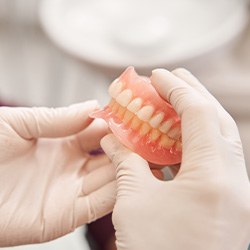
Although dentures can be adapted to meet many peoples’ unique needs, that doesn’t make them the best restoration for every circumstance. These prosthetics are best suited to those who have:
- Significant or total tooth loss.
- Dental sensitivity.
- Severely damaged or decayed teeth.
- Sufficient jawbone density.
- A commitment to their dental hygiene routine.
Once our team examines your condition, we’ll recommend an appropriate solution. Whether you need full, partial, or implant dentures, we can provide lifelike artificial teeth to restore your smile’s functionality and appearance.
Alternative Tooth-Replacement Options
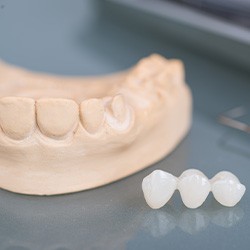
If we find that you’re not a good candidate for dentures, don’t worry! Sometimes, another procedure might be required before you can proceed, like a bone graft to bulk up your jaw.
Otherwise, we might recommend a different type of replacement, such as:
- Dental bridges. These are ideal for people who have lost one or several teeth consecutively. It contains the correct number of artificial teeth with a dental crown on each end. These anchor to healthy teeth or implants on either side of the gap in your grin.
- Dental implants. These are the only prosthetics surgically placed into your jawbone for added strength and longevity. They usually are more expensive initially but usually require fewer repairs over time.
Types of Dentures

Depending on the extent of your tooth loss and the state of your oral health, Dr. Graber may recommend one of the three main types of dentures:
Partial Dentures

Even if you’re only missing a few teeth here and there, eating and smiling can make you feel self-conscious. Fortunately, a custom-made partial denture can complete your smile in such a way that onlookers shouldn’t be able to tell the difference between your denture and your natural teeth.
Made of a gum-colored acrylic base and a metal wire, a partial denture fits into your smile like a lost puzzle piece. Prosthetic teeth will be created in the exact spots to fill the gaps in your grin. They’ll be personalized to mimic the size, shape, and color of your original pearly whites.
Full Dentures

A full denture brings back an entire row of lost teeth. This custom-fit prosthetic sits comfortably on top of your gums. Natural suction should be enough to keep it in place, but a bit of denture adhesive can also help.
Implant-Retained Dentures

If you’re looking for a more secure solution, implant-retained dentures may be just the treatment for you. Your dentist can place just four to six dental implants per jaw. As the titanium posts fuse with the jawbone, they can provide enough support for a full or partial denture. Because of this integration, an implant-retained denture can last significantly longer than its traditional counterparts.
How Dentures are Made
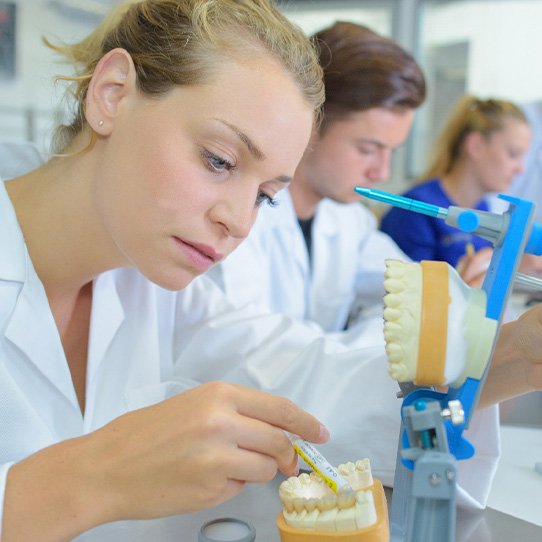
As you weigh whether to get dentures, you may want to learn how they’re made. Having that knowledge would help you appreciate the replacement teeth more. Thankfully, we can share the details on denture creation with you. Looking them over should help you grasp if treatment is right for you, ensuring you get the best results possible. Just keep reading to learn the relevant points, or call our office soon!
What are Dentures Made Of?
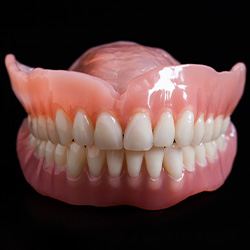
From partial to full types, every denture has a base and artificial teeth. These two parts are crucial to the overall treatment, allowing it to work properly and without issue. Consider their details below:
- Denture Base – As its foundation, a denture’s base is the part that keeps its artificial teeth secure. Technicians often make it from pink-colored acrylic or suitable substitutes like nylon.
- Artificial Teeth – The artificial teeth (per their name) are the tooth-replacing parts of dentures. Generally, labs make them from resin or porcelain to match your smile’s color.
The Denture Creation Process
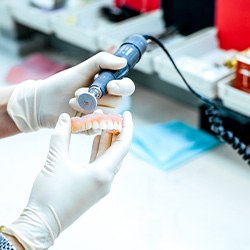
Each denture is customized for its patient’s mouth, so creating one is a multi-step process. The core steps include:
- Step 1: Our dentists will use a dental impression to design a plaster model, which is made to match your final denture’s size and shape.
- Step 2: We’ll send the model to a lab that uses it to make a wax gumline.
- Step 3: Once the wax gumline is ready, workers will set artificial teeth in it; doing so forms a prototype denture.
- Step 4: After we get it back, our team will check the prototype against your mouth. We’ll then return it when we’ve confirmed its fit.
- Step 5: After removing the wax, a worker will place the prototype in a flask. They’ll then apply plaster to the flask and have it sit in hot water.
- Step 6: To keep the prototype’s materials from sticking, a separator will go into its plaster layer. Acrylic will be injected into the flask to replace the wax.
- Step 7: The dental lab will remove all plaster to reveal the final denture. Then, they’ll place the restoration in a bath to remove its residue.
- Step 8: The lab’s workers will remove your denture’s excess acrylic and polish its surface.
- Step 9: To ensure it works smoothly and easily, our office will fit your final denture for you.
Adjusting to Your New Dentures
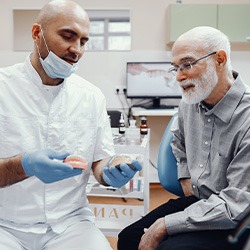
Your mouth will ache a bit as it first adjusts to dentures, but don’t worry; this effect is temporary and fades quickly. You’ll become more familiar with your new teeth as you spend time using them.
That said, certain methods could speed up the adjustment process for you. One idea would be to eat soft foods to avoid irritated gums. Similarly, you have the option of applying adhesives (to keep your dentures secure) or exercising facial muscles. These approaches would help your new teeth feel familiar more quickly.
If the pain from your adjustment persists, please call our office. There’s a chance your denture(s) need further alteration to fit well.
The Benefits of Dentures

If you’ve been struggling with missing one, several, or all of your teeth, then you know how difficult it can be to perform daily tasks like eating, talking, and smiling comfortably. Not only can this affect your speech and diet, but it can also negatively impact your self-esteem. However, by choosing to restore your pearly whites with dentures, you’ll be able to enjoy showing off a confident grin again! Here are several benefits of dentures you can expect from your dentist in Shelton.
Psychological Benefits

Losing any number of teeth can have a major impact on your self-confidence and quality of life. Many people who’ve suffered tooth loss end up experiencing an increased risk of social anxiety, sadness, and even depression. By renewing your complete smile with dentures, you can avoid worrying about the way you look when you talk or laugh. Since you’ll be able to eat and speak more confidently again, you’ll also enjoy a boost in self-esteem when engaging in social activities.
Clearer Enunciation

It can be challenging to pronounce and enunciate certain words whenever you’re missing teeth. This is because your lips and tongue interact with them to perform the proper speech. Without most of your pearly whites, it can be difficult to communicate effectively. Since dentures restore your entire smile, they can make it easier for you to converse with others again. While this may take some practice to get accustomed to using them, you’ll be able to speak more fluently and confidently in no time!
Improves Nutrition

Tooth loss can impact the appearance of your smile as well as the kinds of foods you can eat. If you aren’t able to chew your meals like before, you might experience problems like indigestion and malnutrition. By returning your teeth with dentures, you’ll regain your ability to munch on your food, expanding your diet for more nutritious options. You’ll even be free to consume meals that contain essential nutrients to promote optimal oral and overall health.
Preserves Oral Health

Whenever you’re missing teeth, any nearby pearly whites can begin to shift out of place to fill in the gap. If left unchecked, it can lead to further tooth loss and jawbone resorption. These potential complications can be avoided by getting dentures, which can help support their positions. Your restorations can also withstand more of the pressure of chewing, allowing you to avoid further wear and tear of your remaining natural teeth.
Expands Opportunities

Your smile is one of the most crucial parts of a first impression, as this is one of the main things people will notice about you. This is especially the case during job interviews, social gatherings, and even first dates. In fact, according to a 2019 study, poor oral health was closely associated with a lower probability of being employed. For this reason, regaining your complete smile with dentures will improve both your oral health and boost your career and personal opportunities in the long run!
Understanding the Cost of Dentures

As with any type of dental work, the cost of dentures can vary greatly from patient to patient. During your consultation, Dr. Graber will go over all of the factors that will affect the price and what you can expect to pay for them during your appointment. Following this visit, you’ll have a much clearer understanding not only of what you can expect to pay, but what your future denture will look and feel like.
Factors that Affect the Cost of Dentures

Overall, there are many factors that influence the final price tag of your denture. These factors include but are not limited to:
- Any preparatory work you’ll need (tooth extractions, gum disease therapy, etc.)
- The number of teeth you’re missing
- The materials your denture will be made of (which can include porcelain or acrylic)
It’s important to keep in mind that just because your denture is cheaper does not necessarily make it worth having. Very cheap dentures tend to break easily or require replacement much sooner than you’d expect. For something that’s not only going in your mouth but getting used every day, it’s always better to consider it a worthwhile investment.
Are Implant Dentures More Expensive?

Implant dentures require oral surgery and the placement of multiple dental implants, making them a more expensive treatment overall. However, this isn’t for no reason. The fact is implant dentures are far more reliable day-to-day because they do not shift out of place while in use. They also help to stimulate the jawbone, providing you with increased biting strength and longevity. You also won’t need to replace your denture nearly as often (i.e. implant dentures can last for decades, while traditional dentures typically need replacement every 5 to 7 years.)
Does Dental Insurance Cover Dentures?

In most dental plans, you can expect some level of coverage when it comes to dentures. Many of them provide up to 50% coverage, but this will vary from plan to plan. Our practice is currently in-network with a wide variety of dental insurance providers, making it easier for you to save money on care. A member of our team will gladly look over your policy and maximize your benefits to lessen your out-of-pocket expenses.
Other Options for Making Dentures Affordable

If you do not have dental insurance coverage at this time or your plan does not cover costs as much as you thought it would, there are other options available to you. For example, we can also help you break up your cost into reasonable monthly installments through a CareCredit plan. This financing option can make even the most expensive dental treatments fit into just about any budget.
The best way to learn how your costs will add up for dentures is to set up a consultation with our practice. Our team is always happy to answer questions and help you feel confident about your future tooth replacement.
I Need a Checkup & Cleaning I am Looking for a Dentist for My Child I am Concerned about Bleeding Gums I Have a Cavity or Broken Tooth I am Missing One or More Teeth I am Unhappy with My Smile I Want a Straighter Smile I am Scared of the Dentist I am in Pain & Need Help View Our Services